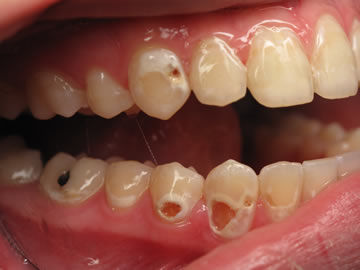Everybody wants their teeth to be the best they can be – apart from avoiding toothache and other dental problems, great cosmetic dental habits can make you feel more confident on a daily basis.
Any dentist will tell you that the food you eat plays an important role in dental hygiene. After all, if we are what we eat, it’s our teeth that illustrate our eating habits. Avoiding certain foods will help you cut down on plaque – the sticky, bacteria-ridden fill that can lead to decay and gum disease if left unchecked.
But what are the principal offenders when it comes to plaque-producing foods? Some answers might surprise you!
The worst foods for your dental health.
- Most people know this one – sugar provides a perfect breeding ground for bacteria that emits the acids that wear down your enamel and cause those painful cavities and abscesses. Sticky sweets that contain refined sugar are the worst – think lollies, caramels, toffees and even cough drops. Those mouth-puckering sour candies are particularly dangerous because they contain higher levels of acid that attack your teeth. Some say chocolate can prevent decay, but this isn't' conclusively proven (sweet manufacturers fund most studies promoting chocolate in the fight against cavities), so stick to dark (70 per cent) chocolate and always enjoy in moderation.
- Foods like bread and potato chips are just as bad as outright sugar candies as the addition of saliva simply breaks them down into sugars. Worse still, in your mouth, they take on a glue-like consistency that sticks to your enamel and deposits into the crevices between your teeth, where they can quickly promote decay. Foods that crunch are a clear sign that you're welcoming in bacteria – and gorging potato chips produces even more lingering acid that proves anathema for enamel. Whole wheat bread contains fewer sugars than commercial white bread, so consider switching to them for your daily sandwich if you want a great looking smile. And always floss immediately after eating to get rid of those sticky bits.
- Carbonated drinks. Did you know a recent study has determined excessive consumption of fizzy drinks can be worse for your oral health than crack cocaine? Again, that's because they produce more acid – so if you prefer soft drinks over other liquids, you're essentially dipping your enamel in a bath of acid all day. And because they don't help hydrate you, you'll want to drink more, which dries out your mouth and reduces saliva production (plus dark coloured liquids stain your teeth, so you’ll need to spend more on teeth whitening procedures). Don't be tricked into thinking sports drinks are any better – they may sound healthy but still contain loads of sugar. And never brush your teeth after drinking a glass of lemonade or similar – it can speed up the decay process.
- The same goes for alcohol – it dehydrates you and contains heaps of sugar. If you drink excessively over time, your saliva production can severely decrease even when you’re not on the booze. Ultimately that makes you more susceptible to gum disease and mouth cancers, so it pays to limit your intake. And forgo adding ice to your alcoholic beverage of choice – chewing it can lead to tooth chips and cracks, leading to expensive dental surgery.
